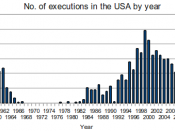�PAGE � �PAGE �3� Abolishing the Death
Abolishing the Death Penalty
Kim Avina
Axia College
�
�
Abolishing the Death Penalty
Even though the death penalty is viewed by some as a deterrent to committing capital crimes, capital punishment should be abolished because it is not always administered justly and it is very costly to the taxpayers. Judge Jeremy Fogel (Morales vs. Tilton, 2006) of the United States District Court for the Northern District of California stated:
Few issues in American society have generated as much impassioned debate as the death penalty. At one end of the spectrum abolitionists condemn the intentional taking of a human life by the state as barbaric and profoundly immoral. At the other end, proponents see death, even a painful death, as the only just punishment for crimes that inflict unimaginable suffering on victims and their surviving loved ones. Even among those with less absolute positions there are vigorous arguments about the social, penological, and economic costs and benefits of capital punishment (p 1).
In 1967, the United States entered into a 10-year moratorium in which no death penalty sentences were carried out. In 1972, Furman v. Georgia (408 U.S. 238), the U.S. Supreme Court voided many state death penalty laws, calling them "arbitrary and capricious". Thirty-five states made changes to address the unconstitutionality of unguided jury discretion. Some states removed that discretion by mandating capital punishment for those convicted of capital crimes. However, in Woodson v. North Carolina (428 U.S. 280 (1976)), the Supreme Court held that practice as unlawful. (Death Penalty Information Center (DPIC), 2007)
In 1976, Georgia, Texas, and Florida provided guidelines for the judge and jury to use when deciding if they should impose death. In Gregg v. Georgia (428 U.S. 153), Jurek v. Texas (428 U.S. 262), and...


